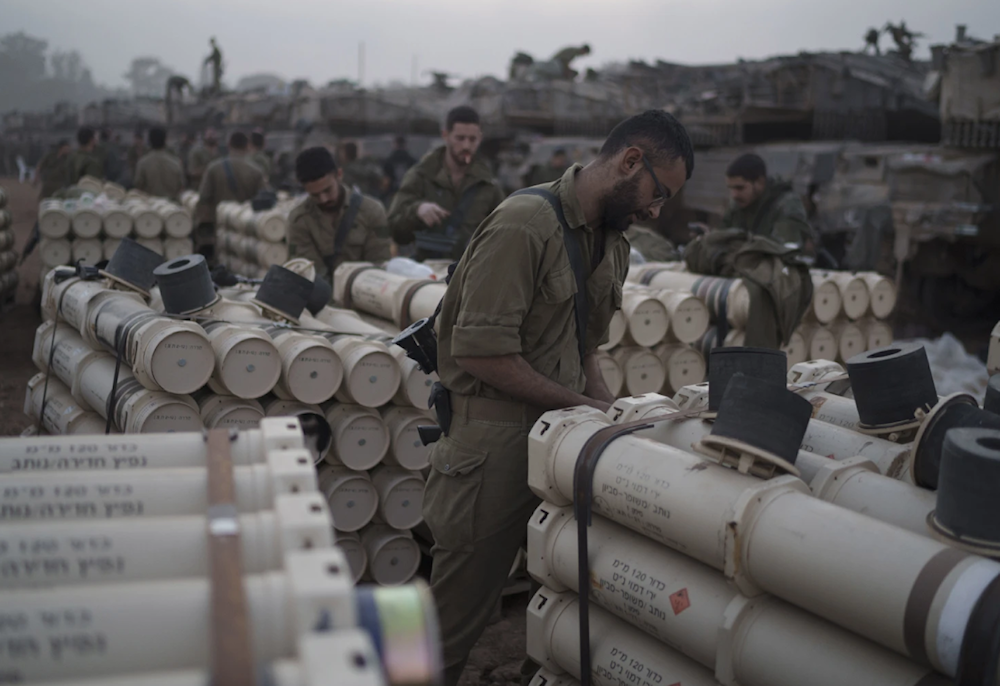Paying 'Israel's' war bills may force difficult choices: AP
In the three months following Operation Al-Aqsa Flood, the occupation's economic output shrank by 5.6%, the worst performance among the 38 OECD members.
-

Israeli occupation forces store tank shells in a staging area at the border with Gaza in southern occupied Palestine on January 1, 2024. (AP)
In addition to the heavy death toll, "Israel's" war on Gaza and Lebanon has been expensive, raising concerns about the long-term impact of the aggression on the occupation's economy. Military spending has surged and growth has stalled, especially in the dangerous border areas that have been evacuated. Economists warn that "Israel" may face a decline in investment and an increase in taxes as the war strains government budgets, forcing a choice between social and military programs.
The Israeli government spends significantly more each month on the military, increasing from $1.8 billion before the war began last year to approximately $4.7 billion by the end of last year, according to the Stockholm International Peace Research Institute.
Last year, the occupation's government spent $27.5 billion on the military, ranking fifteenth globally, behind Poland but ahead of Canada and Spain, both of which have larger populations. Military spending as a percentage of annual economic output stood at 5.3%, compared to about 3.4% for the US and 1.5% for Germany.
In the three months following Operation Al-Aqsa Flood, the occupation's economic output shrank by 5.6%, the worst performance among the 38 OECD members. Military call-ups and extensions threaten to reduce the labor supply. Security concerns deter investment in new projects, while disruptions in flights have kept tourists away, negatively impacting the tourism industry.
Meanwhile, the government is covering housing costs for thousands who have evacuated near the Gaza southern border and the north, where Hezbollah, the Lebanese Resistance, has maintained fire.
Among the biggest concerns is the nature of the open-ended war that has lasted more than a year. Comparatively, the Israeli economy recovered quickly from the 2006 war with Hezbollah in South Lebanon, which lasted only 34 days.
On September 27, Moody’s Ratings referenced this concern when it downgraded the Israeli government’s credit rating by two notches.
Israeli Finance Minister Bezalel Smotrich's 2025 budget projects a deficit below 4%, claiming that this will help maintain a stable debt burden. Moody's expressed skepticism about these figures, predicting a 6% shortfall for the coming year.
Karnit Flug, former governor of "Israel’s" central bank, warned that the credit downgrade will increase borrowing costs, likely resulting in cuts to public services and higher taxes for Israelis.
Big investors 'abandon' Israeli real estate sector: Globes
Investors who purchase substantial numbers of apartments in the Israeli-occupied territories are "abandoning" the Israeli real estate market, according to a survey conducted by the Israeli Ministry of Finance's chief economist.
Previously, such investors made up the majority of those purchasing settlement units and apartments, however, in August they made up only 33% of all investors who made such transactions.
Reviews conducted by the Ministry’s chief economist and the Israeli Central Bureau of Statistics found that real estate deals fell by 16% this month. Moreover, the chief economist said that 1,200 apartments were bought in the past year every month, a figure that amounts to half of the monthly number of apartments bought on average in 2021, underlining the severity of the crisis.
In February this year “heavy investors” had a 72% share of the market, however, the number dropped to 35% in August.
Israeli news website Globes explained that the drop could be attributed to “uncertainty in Israel’s economy.”
Another explanation could be that investors do not believe that apartment prices will rise due to the ongoing wars launched by the Israeli regime and their subsequent effects on the Israeli economy, according to the report.

 4 Min Read
4 Min Read








